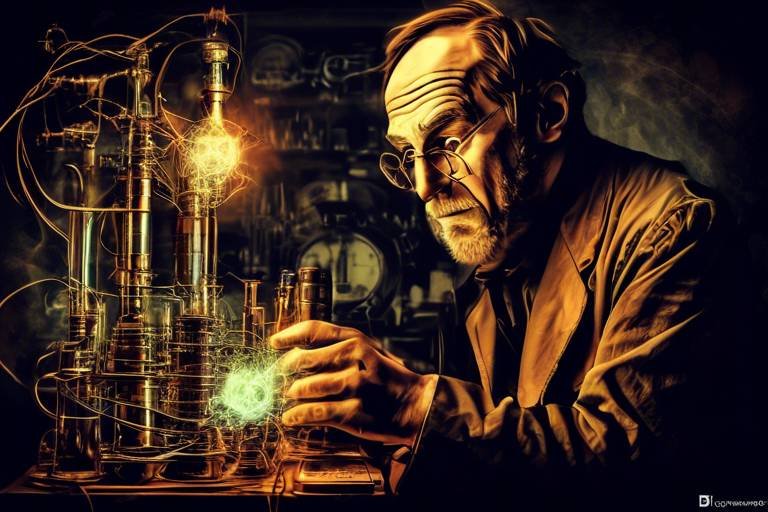Davy: The Pioneer in Electrochemistry
Sir Humphry Davy, a renowned chemist, stands as a pioneer in the realm of electrochemistry, leaving an indelible mark on scientific exploration. His relentless pursuit of knowledge and groundbreaking experiments have shaped the very foundation of modern electrochemical research. Davy's insatiable curiosity and innovative approach have paved the way for new discoveries and advancements in the field of chemistry.

Early Life and Education
Sir Humphry Davy, the pioneer in electrochemistry, had a fascinating journey that began with his early life and education. Born in Penzance, Cornwall, in 1778, Davy grew up in modest surroundings with a deep curiosity about the natural world. Despite limited formal education, his passion for science led him to pursue various experiments and readings on chemistry, igniting his interest in the field.
At the age of 19, Davy secured a position as an apprentice to a local surgeon and apothecary, where he gained practical experience in chemical analysis and laboratory techniques. This hands-on training played a crucial role in shaping Davy's scientific skills and laying the foundation for his future accomplishments in the realm of chemistry.
Driven by a thirst for knowledge, Davy immersed himself in scientific literature and conducted independent research, exploring the properties of gases and the effects of different elements on chemical reactions. His insatiable curiosity and dedication to experimentation set him apart as a young scientist with immense potential.
Despite facing financial challenges and societal barriers, Davy's determination and intellectual prowess caught the attention of prominent scientists of the time, eventually leading to his appointment as an assistant lecturer at the Royal Institution in London. This opportunity marked a turning point in Davy's career, providing him with a platform to showcase his innovative ideas and groundbreaking experiments.
Through his early life experiences and educational journey, Davy honed his analytical skills and developed a unique approach to scientific inquiry. His unconventional thinking and bold experimentation would later propel him to the forefront of electrochemical research, where he made enduring contributions to the field and reshaped our understanding of chemical phenomena.

Discovery of Potassium and Sodium
Sir Humphry Davy's discovery of potassium and sodium marked a significant milestone in the field of chemistry. Through his groundbreaking experiments, Davy challenged existing scientific beliefs and revolutionized the understanding of alkali metals. By utilizing electrolysis, a process involving the use of electric current to induce chemical reactions, Davy was able to isolate and identify these reactive elements. His meticulous approach to experimentation and keen observation skills were instrumental in uncovering the properties of potassium and sodium, paving the way for further advancements in electrochemistry.

Electrolysis Experiments
During his electrolysis experiments, Sir Humphry Davy made groundbreaking discoveries that revolutionized the field of chemistry. By passing an electric current through various compounds, Davy was able to observe the decomposition of substances into their constituent elements. One of his most notable experiments involved the electrolysis of molten compounds, such as potassium hydroxide and sodium hydroxide, which resulted in the isolation of the alkali metals potassium and sodium.
Through meticulous observation and precise control of the experimental conditions, Davy demonstrated that the application of electric current could induce chemical reactions that were previously thought impossible. His work challenged the prevailing theories of chemical composition and opened up new possibilities for understanding the nature of matter.
In one of his most famous experiments, Davy used electrolysis to separate water into its component gases, hydrogen and oxygen. This experiment not only confirmed the composition of water but also provided valuable insights into the fundamental properties of elements and compounds.
By pushing the boundaries of scientific knowledge through his electrolysis experiments, Davy laid the groundwork for modern electrochemistry and inspired future generations of chemists to explore the hidden mysteries of the chemical world.

Influence on Modern Chemistry
This article explores the life and contributions of Sir Humphry Davy, a renowned chemist who made significant advancements in the field of electrochemistry. Davy's experiments and discoveries laid the foundation for modern electrochemical research.
Discover Davy's humble beginnings and his journey to becoming a prominent figure in the scientific community. His educational background and early influences shaped his interest in chemistry and laid the groundwork for his groundbreaking discoveries.
Learn about Davy's groundbreaking experiments that led to the discovery of the alkali metals potassium and sodium. His use of electrolysis revolutionized the field of chemistry and challenged existing scientific beliefs.
Explore the details of Davy's electrolysis experiments, where he demonstrated the decomposition of compounds using electric current. His innovative approach to chemical reactions paved the way for new discoveries in electrochemistry.
Understand Davy's lasting impact on the field of chemistry and his influence on future generations of scientists. His methods and discoveries continue to shape the way we study and understand chemical reactions today.
Discover Davy's invention of the safety lamp, designed to prevent explosions in coal mines. This life-saving device revolutionized mining practices and ensured the safety of miners working in hazardous conditions.
Learn about the legacy that Davy left behind and the recognition he received for his contributions to science. His pioneering work in electrochemistry cemented his place in history as a key figure in the field of chemistry.
Explore some of Davy's other notable scientific achievements beyond electrochemistry. From his work on gases to his studies of flame and combustion, Davy's contributions spanned a wide range of scientific disciplines.
Understand how Davy's principles and discoveries are still relevant in modern scientific research. His innovative approaches to experimentation and chemical analysis continue to inspire new advancements in the field of chemistry.

Davy's Safety Lamp
Sir Humphry Davy's invention of the safety lamp marked a significant milestone in the history of mining safety. The safety lamp was designed to prevent explosions in coal mines, where the presence of flammable gases posed a constant threat to miners' lives. Davy's lamp worked on the principle of enclosing the flame within a mesh screen, allowing for the diffusion of heat without igniting the surrounding methane gas.
This innovative design revolutionized mining practices by providing a safer environment for miners to work in. Before the introduction of Davy's safety lamp, miners relied on open flames, which often led to disastrous explosions due to the presence of flammable gases in the mines. The safety lamp not only reduced the risk of explosions but also increased the overall safety standards in the mining industry.
One of the key features of Davy's safety lamp was its ability to alert miners to the presence of dangerous gases in the mine. If the flame inside the lamp burned with a blue or smoky color, it indicated the presence of methane or other flammable gases, warning the miners to evacuate the area immediately. This early detection system proved to be crucial in preventing potential disasters and saving countless lives.
The impact of Davy's safety lamp extended far beyond the mining industry, influencing the development of safety measures in various hazardous environments. The principles behind the design of the safety lamp continue to be applied in modern safety devices, emphasizing the importance of early detection and prevention of potential hazards.

Legacy and Recognition
Sir Humphry Davy's legacy in the field of chemistry is unparalleled, with his groundbreaking contributions continuing to shape modern scientific research. His innovative experiments and discoveries have solidified his position as a pioneer in electrochemistry, leaving a lasting impact on the scientific community.
One of Davy's most notable achievements was the discovery of the alkali metals potassium and sodium through his revolutionary electrolysis experiments. By challenging existing scientific beliefs, Davy paved the way for a new understanding of chemical reactions and the principles of electrochemistry.
Furthermore, Davy's invention of the safety lamp stands as a testament to his commitment to improving safety standards in hazardous environments. The safety lamp revolutionized mining practices, preventing explosions in coal mines and saving countless lives in the process.
Throughout his career, Davy received widespread recognition for his contributions to science. His pioneering work earned him prestigious awards and accolades, solidifying his reputation as a key figure in the history of chemistry.
Moreover, Davy's scientific achievements extended beyond electrochemistry, encompassing a diverse range of disciplines. From his studies on gases to his investigations into flame and combustion, Davy's legacy continues to inspire scientists across various fields.
In modern scientific research, Davy's principles and methodologies remain relevant, serving as a source of inspiration for new generations of researchers. His emphasis on experimentation and chemical analysis continues to drive innovation and discovery in the ever-evolving field of chemistry.

Scientific Achievements
Sir Humphry Davy's scientific achievements extended far beyond his groundbreaking work in electrochemistry. One of his notable contributions was in the field of gases, where he conducted experiments that led to the discovery of several new elements. Davy's meticulous studies on the properties of gases and their interactions with other substances helped expand our understanding of chemical reactions.
Furthermore, Davy made significant advancements in the study of flame and combustion. By investigating the nature of flames and the processes involved in combustion, he provided valuable insights into the chemical reactions that occur during burning. His research in this area not only improved safety measures but also laid the groundwork for future studies on heat and energy transfer.
In addition to his work on gases and combustion, Davy delved into the realm of mineralogy, where he made important discoveries related to the composition and properties of minerals. Through his experiments and analyses, Davy was able to identify new mineral species and classify them based on their chemical composition, contributing to the field of earth sciences.
Moreover, Davy's research on the nature of acids and bases further expanded the knowledge of chemical reactions and their effects on different substances. By exploring the behavior of acids and bases in various conditions, Davy was able to elucidate the principles governing their reactivity and provided a foundation for the study of chemical equilibrium.
Overall, Sir Humphry Davy's scientific achievements encompass a wide range of disciplines within the field of chemistry, showcasing his versatility and innovative spirit. His contributions continue to inspire and influence researchers in modern science, highlighting the enduring legacy of this pioneering chemist.

Continued Relevance in Modern Science
Despite living in the 18th and 19th centuries, Sir Humphry Davy's principles and discoveries continue to hold significant relevance in modern scientific research. His innovative approaches to experimentation and chemical analysis have paved the way for numerous advancements in the field of chemistry, shaping the way we understand and study chemical reactions today.
One of the key aspects of Davy's work that remains relevant is his emphasis on the importance of rigorous experimentation and observation. By meticulously documenting his processes and results, Davy set a standard for scientific inquiry that continues to be followed by researchers around the world.
Furthermore, Davy's contributions to electrochemistry have had a lasting impact on the development of batteries and fuel cells, essential components of modern technology. The principles he established through his electrolysis experiments laid the foundation for the understanding of energy conversion and storage, which are crucial in the advancement of renewable energy sources.
In addition to his work in electrochemistry, Davy's studies on gases and his investigations into flame and combustion have provided valuable insights into fundamental chemical processes that are still studied and applied in various scientific disciplines today. His pioneering spirit and commitment to pushing the boundaries of scientific knowledge continue to inspire researchers to explore new frontiers in chemistry and beyond.
Frequently Asked Questions
- What were Sir Humphry Davy's major contributions to electrochemistry?
Sir Humphry Davy made significant contributions to electrochemistry through his groundbreaking experiments that led to the discovery of the alkali metals potassium and sodium. His use of electrolysis revolutionized the field of chemistry and laid the foundation for modern electrochemical research.
- How did Davy's safety lamp impact the mining industry?
Davy's invention of the safety lamp was a game-changer for the mining industry as it helped prevent explosions in coal mines, ensuring the safety of miners working in hazardous conditions. This innovative device revolutionized mining practices and saved countless lives.
- Why is Sir Humphry Davy considered a pioneer in chemistry?
Sir Humphry Davy is regarded as a pioneer in chemistry due to his lasting impact on the field. His innovative approaches to experimentation, safety inventions like the safety lamp, and groundbreaking discoveries in electrochemistry have solidified his place in history as a key figure in the scientific community.



















